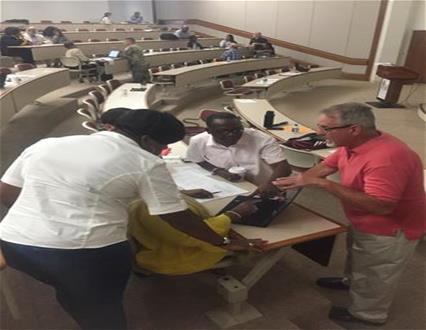Main Content
Oral Communication and Critical Thinking are the University-Wide Student Learning Outcomes to be assessed during the 23-24AY
 GOAL OF ASSESSMENT
GOAL OF ASSESSMENT
The basic goal of assessment is to improve student learning. Students, instructors, and co-curricular personnel are all involved in the collection of data to support assessment of student learning. Adequate analysis and interpretation of assessment data is necessary to support the decision-making process at the University, School, Department, degree program, and co-curricular unit levels. The Assessment Office includes a Director, responsible for all aspects of assessment at UAPB. One of the primary responsibilities of the Director is assessment data analyses and interpretation of analyses in conjunction with academic and co-curricular units. The LiveText Administrator also works in the Office of Assessment. This administrator is responsible for all aspects of the University’s assessment management system, including instructor training, reporting, and troubleshooting.
WHAT IS LIVETEXT?
The assessment management system, LiveText, will be the repository of key assessments of University-wide learning outcomes (a six-year rotation of seven learning outcomes, two to three outcomes assessed every two years). The artifacts demonstrating the learning outcomes of the key assessments will be archived in the system. The rubrics used for these learning outcomes will be consistent across the University, allowing comparisons among units.
UNIVERSITY-WIDE STUDENT LEARNING OUTCOMES
The Assessment Office has identified seven student learning outcomes that are aligned with the mission and vision of the University. The learning outcomes are a subset of outcomes identified by the American Association of Colleges and Universities (AAC&U) in their Value Rubrics. They include Reading, Written Communication, Oral Communication, Critical Thinking, Problem Solving, Teamwork and Foundations and Skills for Lifelong Learning. The Assessment Office is developing curriculum maps of key assessments of those learning outcomes across academic and co-curricular units. The Assessment Office plans to assess two to three of the seven learning outcomes every two years in a 6-year rotation. Key assessments of University-wide student learning outcomes are archived in LiveText and assessed according to the AAC&U Value Rubrics. LiveText facilitates reporting on learning outcomes within and among academic units.
STUDENT LEARNING OUTCOMES IN ACADEMIC UNITS
The Assessment Office worked with each School to choose two School-wide student learning outcomes for assessment during the 2017-2018 and 2018-2019 academic year. Each pair of School-wide student learning outcomes is aligned with goals articulated by the respective Schools.
School-wide SLO's are…
| Agriculture, Fisheries, and Human Sciences |
Global Learning
Human Needs and the Global Environment
|
| Arts and Sciences |
Information Literacy
Teamwork
|
| Business and Management |
Critical Thinking
Ethical Reasoning
|
| Education |
Foundations and Skills for Lifelong Learning
Intercultural Knowledge
|
Schools are working with Departments to create curriculum maps for each Department within the School, indicating key assessments relative to introduction, reinforcement, or assessment of mastery of the pairs of School-wide student learning outcomes. The key assessments are archived in LiveText and assessed according to the AAC&U Value Rubrics or other rubrics standardized across Departments within Schools.
Schools, Departments, and degree programs may have assessment needs relative to accreditation at the unit level. The Assessment Office works with accredited/licensed/state certified academic units to fulfill their assessment requirements and undertake program reviews for accreditation in two specific ways. The Assessment Office helps create curriculum maps, key assessments, and rubrics in LiveText related to professional standards outlined by accrediting agencies. The Assessment Office also helps units design database tables of unit-specific key assessments. If unit-specific key assessments are organized by Student ID, the relationships between transition point learning outcomes and discipline-specific learning outcomes can be examined. Examples of unit-specific key assessments would include portfolio assignments, capstone course assignments, professional licensure tests, or accrediting agency competencies.
The Arkansas Higher Education Coordinating Board revised their policy for review of existing academic programs (AHECB Policy 5.12) in 2008. The policy states that, “Accredited/licensed/state certified programs will follow the usual review practices and schedule of the accrediting/approval body.” Academic units not program-specific accredited will be “externally reviewed every 7-10 years.” The Assessment Office helps academic units not program –specific accredited undertake self studies by creating curriculum maps, key assessments, and rubrics in LiveText related to unit goals, by designing database tables of unit-specific key assessments, and by assisting with analysis and interpretation of relationships within and among unit-specific key assessments and transition point key assessments.
STUDENT LEARNING OUTCOMES IN CO-CURRICULAR UNITS
Through a variety of co-curricular activities, students gain social and academic skills important to success in their college endeavors. Assessments occur in a variety of co-curricular units in several divisions. Co-curricular units of the Academic Affairs division, which have undertaken assessments, include UAPB’s Quality Initiative, Honors College, Military Science, the Watson Memorial Library, the Viralene J. Coleman Computerized Writing Center, and the International Programs Office. Co-curricular units of the Student Affairs division, which have undertaken assessments, include Career Services, the Office of Student Involvement and Leadership, Disabilities Services and Veterans Affairs, and Title IX. The Stem Academy in the division of Research, Innovation, and Economic Development has undertaken an assessment. Co-curricular units in the division of Enrollment Management and Student Success include the Student Success Center, the LIONs Program, and the Harold Complex Living and Learning Center. The Division of Athletics has also undertaken assessments of a student learning outcome. Student learning outcomes in co-curricular programs revolve around themes of persistence and completion, leadership development, and career readiness.
Contact Us

Arthur Thomas, LiveText Administrator
Office of Assessment
thomasa@uapb.edu
870-575-8173

Steve Lochmann, Director
Office of Assessment
assessment@uapb.edu
870-575-8170